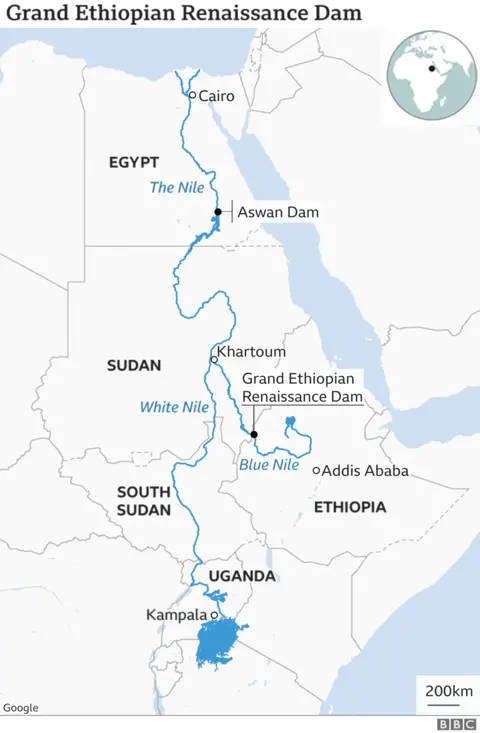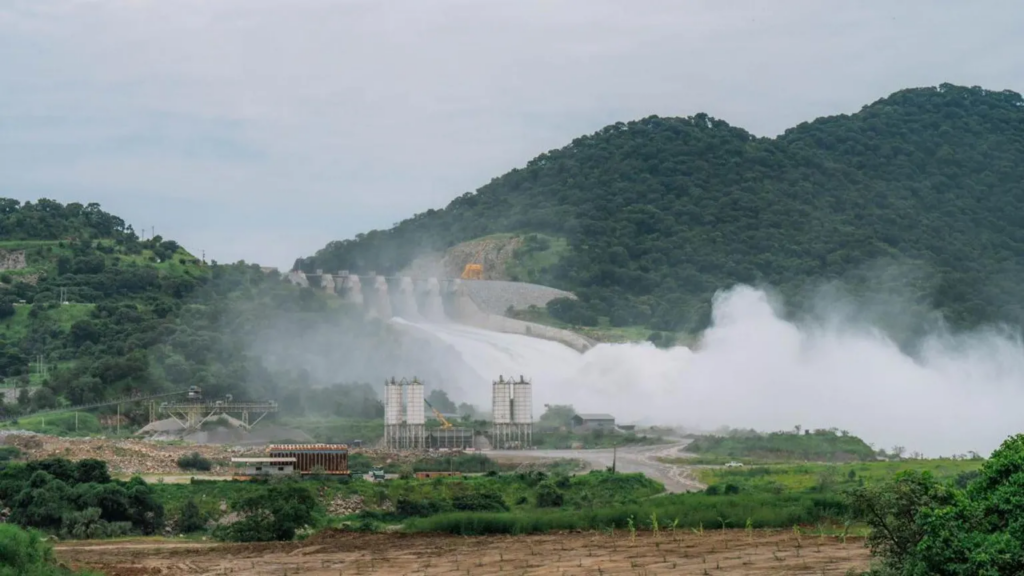Ethiopia has said Egypt “must abandon its aggressive approach” towards a controversial hydroelectric dam on the River Nile as tensions between the two countries continue to escalate.
Addis Ababa was responding to a letter Egypt sent to the UN Security Council last week accusing Ethiopia of violating international law by continuing to fill the dam without agreement from downstream countries.
In its letter to the Security Council, Ethiopia rejected what it called “a litany of unfounded allegations” from Cairo.
This latest round in a long-running dispute comes as Egypt forges closer military ties with Ethiopia’s neighbour Somalia, which has its own disagreement with Ethiopia.
The row dates back to 2011 when Ethiopia began building the Grand Ethiopian Renaissance Dam (Gerd) on the Blue Nile, a tributary from where 85% of the Nile's waters flow.

Egypt sees this as an existential issue as it relies almost entirely on the river for its water and fears that the dam could mean that the flow of the river is disrupted. It also says that two colonial-era treaties guarantee that it has a right to veto upstream projects.
But for Ethiopia, the huge project, set to be the largest hydroelectric plant in Africa, is an integral part of its efforts to develop the country and get electricity to millions of households.
The dam is nearing its completion, with the reservoir filling with water since 2020, and has already started generating power.
Egypt, along with Sudan – through which the Nile also flows, have been raising concerns that their essential water supplies would be under threat, especially if there are successive years of drought.
Multiple diplomatic efforts to reach a binding deal have not succeeded.
The most recent efforts ended in December last year with both countries accusing the other of intransigence.
In its letter to the Security Council, Ethiopia said Egypt was "only interested in perpetuating its self-claimed monopoly" over the river.

In recent weeks, tensions across the Horn of Africa have grown, especially after a military pact was agreed between Egypt and Ethiopia’s eastern neighbour Somalia.
Relations between Mogadishu and Addis Ababa deteriorated after landlocked Ethiopia signed a deal in January with the self-declared Republic of Somaliland over access to the sea and possible use of the coastline for a naval base.
Somalia sees Somaliland as part of its territory and said the agreement was an act of aggression.
This weekend, Ethiopia’s Prime Minister Abiy Ahmed warned against attacks on his country, saying anyone from “afar and nearby” daring to invade the country would be repelled.
He did not specify which country he was talking about.
Latest Stories
-
OKESS firearm case: Student, stepfather granted GH¢80,000 bail
9 minutes -
Ghana throws open its doors with visa processing slashed to 5 days in dramatic policy reset
23 minutes -
Italy tightens rules for Italian descendants to become citizens
41 minutes -
Trump ambushes S African leader with claim of Afrikaners being ‘persecuted’
56 minutes -
Judge says US deportations to South Sudan violate court order
1 hour -
US accepts gifted Qatari plane to join Air Force One fleet
1 hour -
Tottenham beat Man Utd to win Europa League & end 17-year wait for trophy
1 hour -
Clear and strong climate policies are antidote to economic uncertainty – UN Climate Chief
2 hours -
Journalism has become politicised and cheap – KSM laments
2 hours -
Climate Education reaches differently-abled children at Garden City Special School
2 hours -
Mahama’s remarks on Cedi vindicate NPP’s economic legacy – Minority
2 hours -
I lied about having radio experience to get hired – KSM
2 hours -
NLC direct University Senior Staff Association to call off strike
2 hours -
Shelters in crisis: Calls grow for gov’t support as caregivers struggle to protect vulnerable children
2 hours -
Black Sherif set for electrifying performance on COLORSxSTUDIOS on May 22
2 hours

